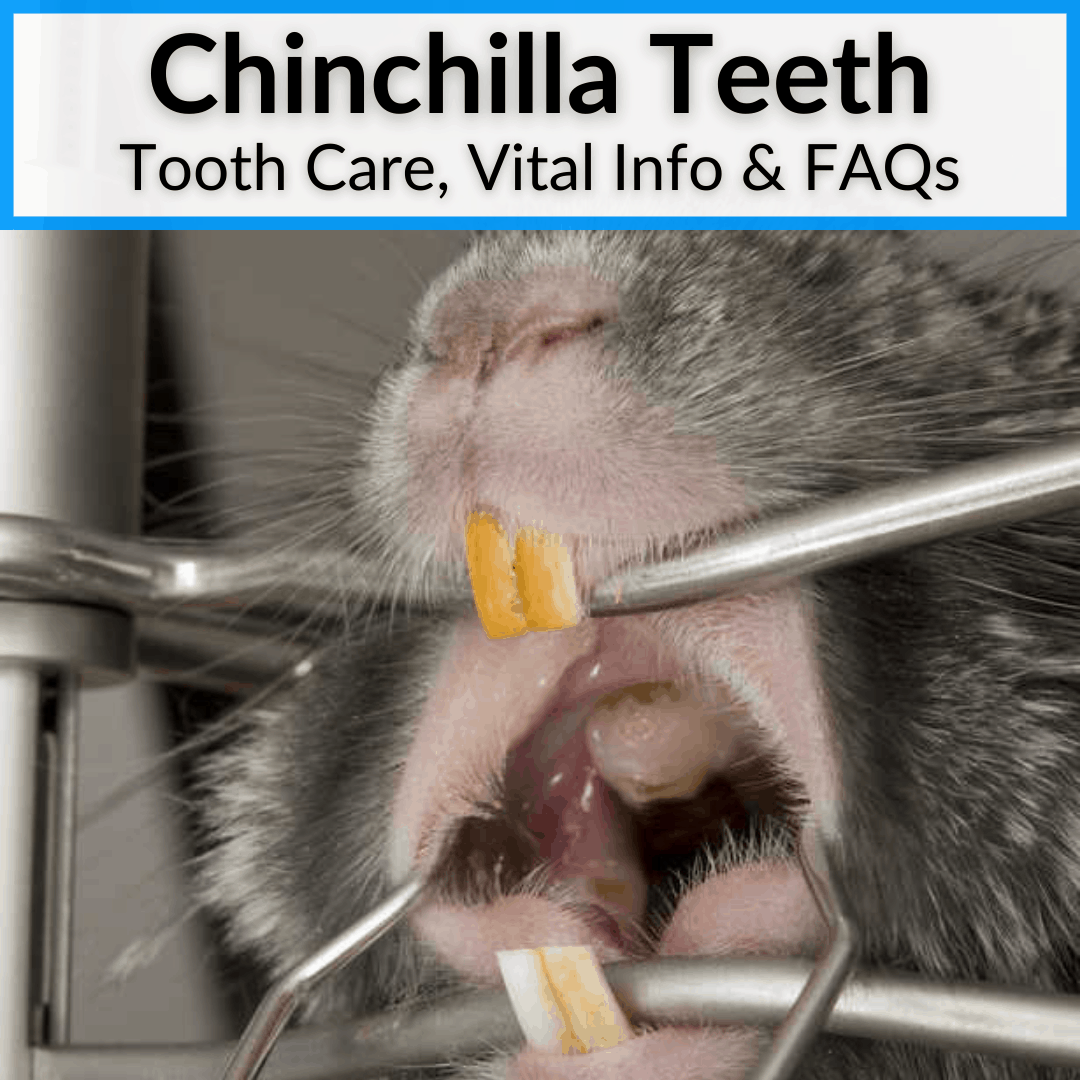
But they do present a few unique challenges.
One of those is something they have in common with other rodents: chinchilla teeth never stop growing.
This means that they need to chew a lot, in order to grind their teeth down and keep them from becoming overgrown.
It also means that dental issues are quite common in chinchillas.
If you own a chinchilla, you need to have a good understanding of their teeth.
Keep reading to learn everything you need to know about chinchilla teeth, so that you can be fully prepared to provide your new pet the best care possible.
Chinchilla Teeth
The first thing you need to understand about chinchillas and their teeth is that they are much like other pets in the rodent family.
As mentioned in the introduction, they have teeth that never stop growing.
This is generally nothing to worry about. But it can become problematic if you are not prepared and don’t understand what steps you need to take to accommodate these animals correctly.
Chewing is essential for chinchillas, and you always need to provide them things to chew on. And the things you provide need to be safe for chewing, of course.
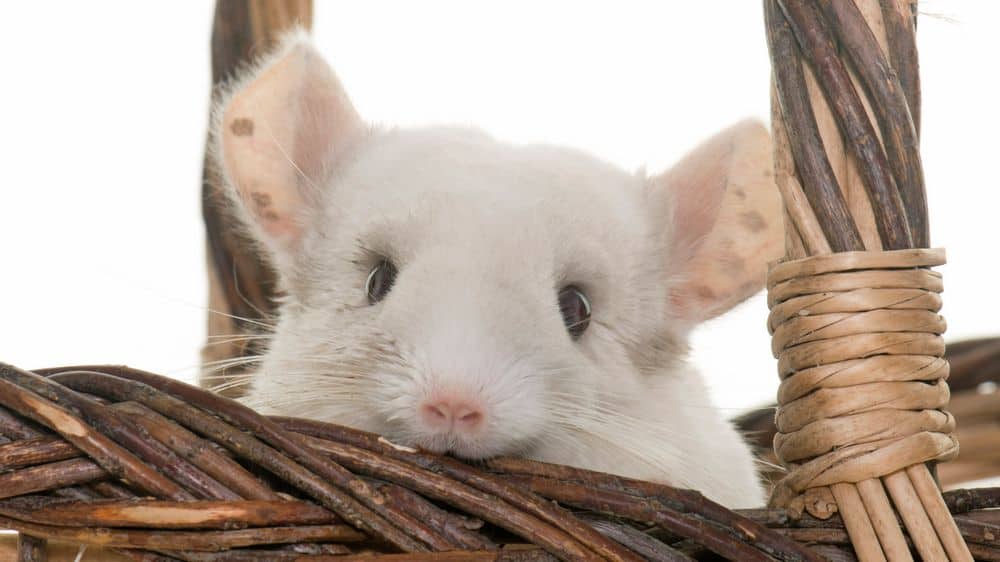
It’s also imperative that you are ready, and able, to recognize any potential chinchilla teeth problems that may occur, or signs that your chinchilla may be giving you that it is in pain and needs you to take action to help.
Don’t worry, I plan on breaking down all these questions, concerns, and topics throughout the rest of this post.
Now that we understand that chinchillas have teeth that never stop growing, let’s look at one of the most commonly asked questions that you may have.
How Many Teeth Does A Chinchilla Have?
This is a common question that comes up frequently from chinchilla owners, or those who are in the beginning process of adopting a new chinchilla.
Chinchillas have a total of 20 teeth. They have four front incisors and 16 back molars. Only the 4 front incisors are visible without using a unique tool, which you need to see the 16 back molars.
If your chinchilla ever has issues with any of these 20 teeth, it’s imperative to seek medical help from a vet as soon as possible. This is because of what we referenced previously.
When chinchillas deal with dental issues, it can become life-threatening relatively easily and quickly.
It can cause infections and pain, and can cause your chinchilla to stop eating, when overgrown teeth or other issues with their teeth present themselves and persist.
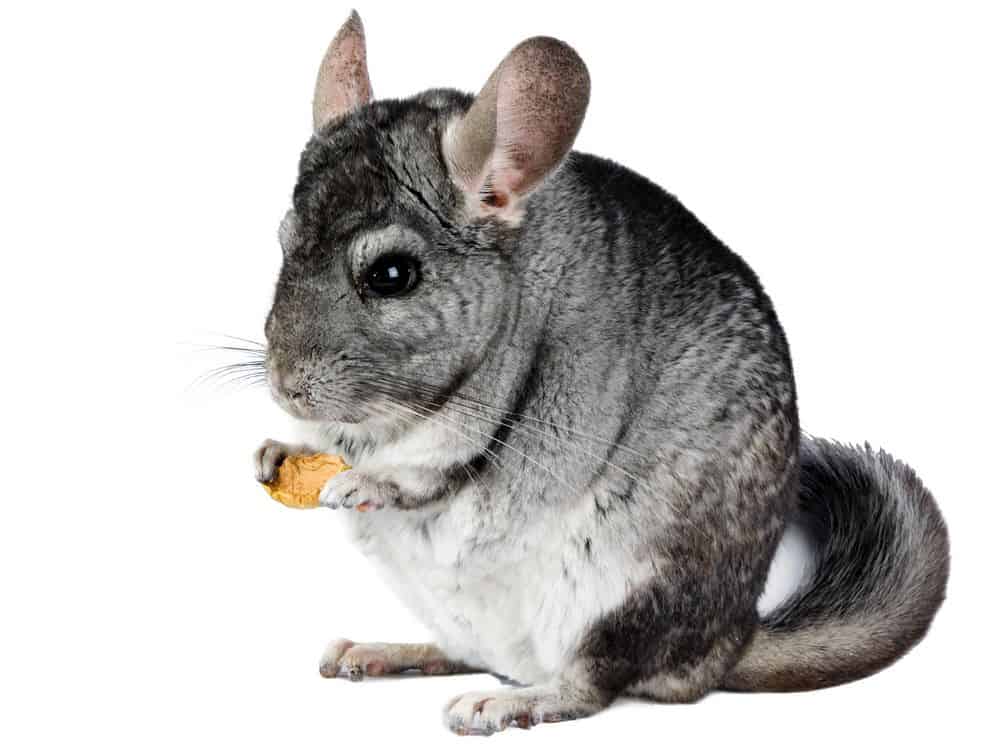
Now that we have some of the basics addressed, let’s get into some of the details about what you need to be looking for with your chinchilla and how to recognize healthy teeth vs. chinchilla teeth that may need attention.
Recognizing Problems And Keeping Your Chinchilla’s Teeth Healthy
It’s tough to know when your chinchilla may be in pain or have a tooth issue, if you don’t understand what you’re looking for. That’s for sure.
Let’s ensure that this isn’t the case for you, and that you have a good understanding.
First, it’s important that your chinchilla’s teeth are straight. This is a good indicator that its teeth are healthy.
It’s also essential that your chinchilla’s teeth are a dark orange color. They should be so dark orange that they are almost red. I know it’s a bit weird that this is the ideal color, but trust me. This is what you want.
When your chinchilla’s teeth begin to fade to a more yellowish tint, it could indicate that it needs some additional calcium.
If that’s the case, you can begin by offering more alfalfa hay to help bring your chinchilla’s calcium levels back to normal. But note that chinchillas can eat alfalfa only occasionally, and not as the main bulk of their diet, due to the high calcium and protein content.
If the alfalfa doesn’t take care of the problem, it’s probably best to stop trying to home remedy the issue and consult with a vet who is certified to work with chinchillas.
If you need further information about the best hay recommendations for chinchillas, you can view my article on the subject here.
Can You Trim A Chinchilla’s Teeth?
Technically, yes. You can trim a chinchilla’s teeth. However, I highly recommend having a vet perform this procedure.
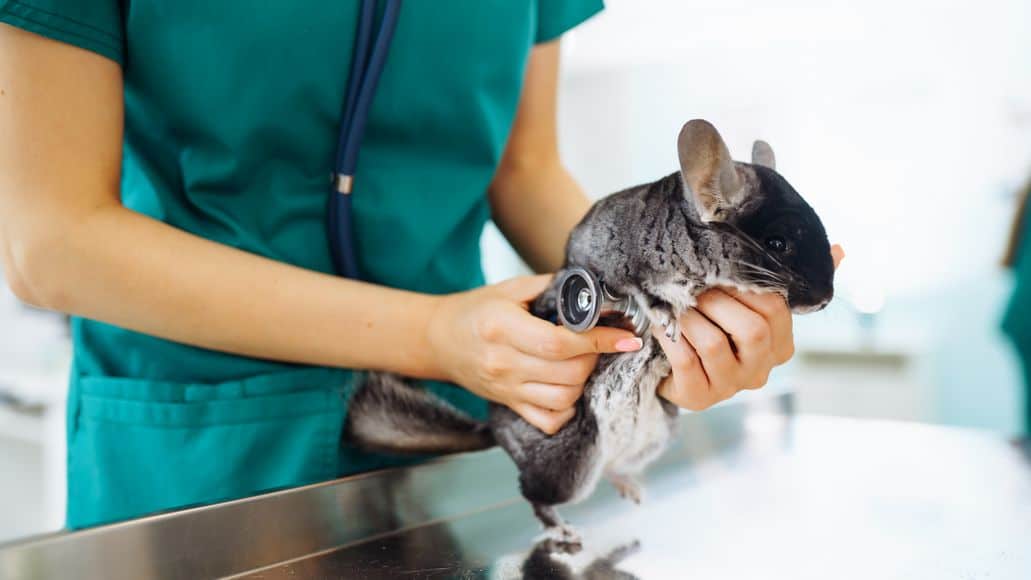
A mistake, like splitting a tooth or cutting it too short, can result in significant pain and further complications.
It’s also typically advised that a chinchilla is put under during these procedures.
A chinchilla’s teeth can be trimmed without causing pain or issues, if done correctly. Especially when the procedure is performed by a professional. But if you do it yourself, the chances of a mistake are simply too high.
Tooth trims can be performed on the chinchilla’s incisors or their molars. Two methods are most common when it comes to trimming a chinchilla’s teeth.
The first requires the use of dog nail trimmers. But using those can easily split the tooth.
The second is to use a Dremel to grind the tooth off.
Trimming typically takes place after a professional has recognized that your chinchilla has a tooth with an issue, or a tooth that has grown too long.
The reasons mentioned above are part of the reason it is always imperative to allow your chinchilla to grind its teeth and have adequate items within its cage to promote this.
If you need further information about finding the best chinchilla chew toys, you can view my post here.
You can also read more about the things chinchillas enjoy playing with here.
Overgrown Chinchilla Teeth And What to Do
We just touched on this topic, but I wanted to reemphasize the main points one more time. Overgrown teeth are a real health problem and a real threat to a chinchilla.
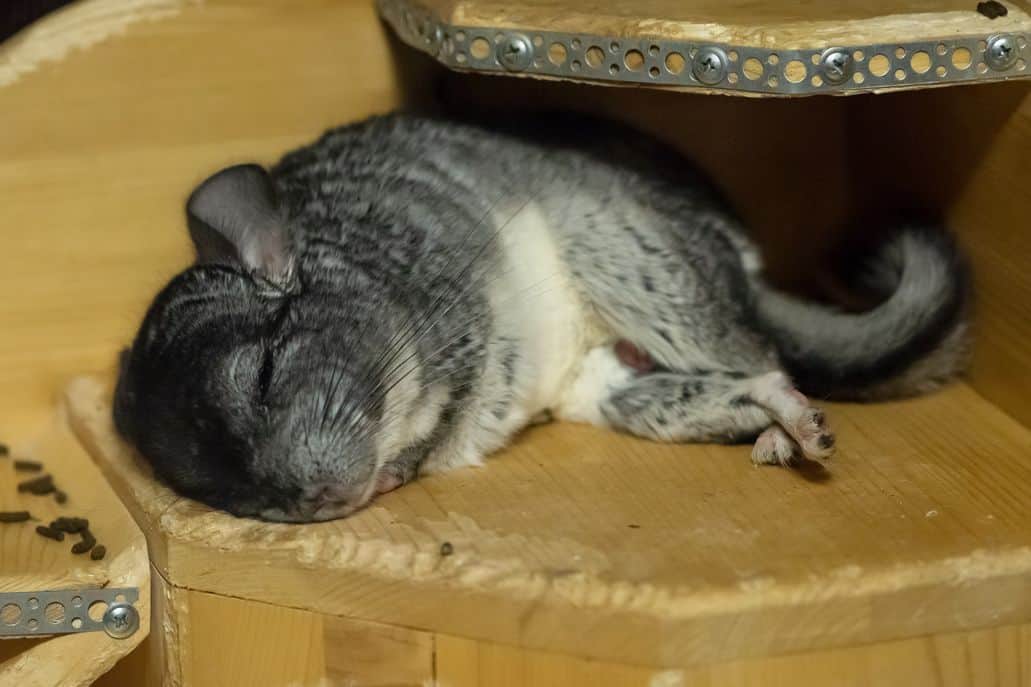
It doesn’t take long for overgrown teeth to begin causing issues, like not eating and possibly even death, if they go unnoticed or untreated.
Here are some of the symptoms to look for that may indicate overgrown teeth. We cover thin is more detail in our article on malocclusion in chinchillas.
- Drooling
- Gagging on food while eating
- Missing fur
- Lethargic behavior
If you notice any of these symptoms, it is imperative to act quickly and seek professional help for your chinchilla before it’s too late.
If you notice the overgrown teeth, and handled the situation, in a timely fashion, it’s likely that a simple tooth trim or another harmless and relatively cheap fix will be sufficient to get your chinchilla back to a healthy and happy state.
Even if you are not sure that you have an overgrown tooth on your hands and only suspect you might, you should still contact a vet. It’s always better to be safe than sorry.
How Fast Do Chinchilla Teeth Grow?
Chinchilla teeth grow rapidly, especially the front ones. The front teeth, which are also referred to as the incisors, can grow up to 3 inches per year.
Clearly, this backs my claims and reemphasizes the importance of allowing your chinchilla to always file down, chew, and grind its teeth as often as possible.
When it comes to owning a chinchilla, its teeth and active monitoring of their health is something that always needs to be a high priority. Plain and simple.
Do Chinchilla Teeth Grow Back?
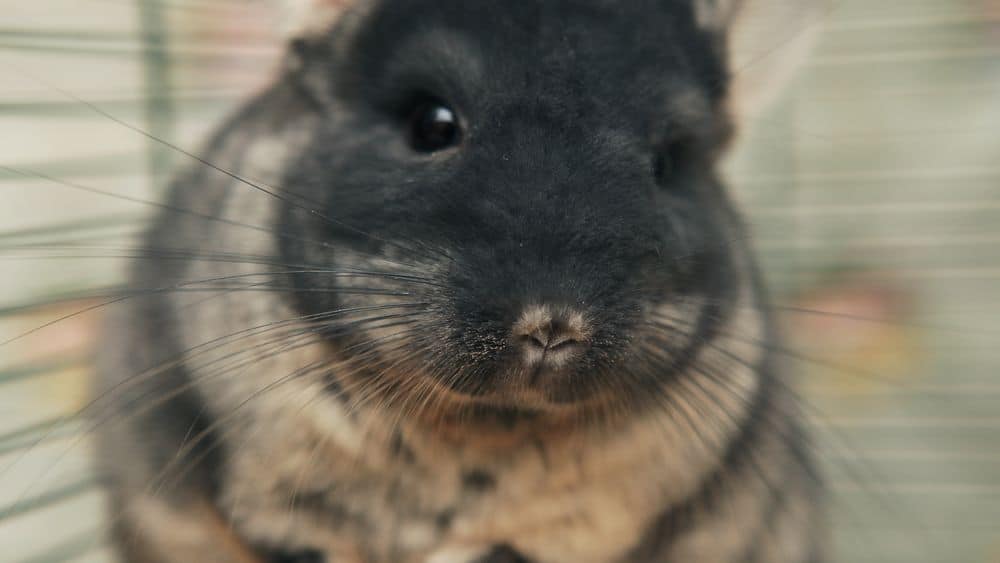
Yes, a chinchilla’s tooth will grow back if it is ground down. Again, chinchilla teeth never stop growing. Unfortunately, it is also possible that a tooth grows back incorrectly, or not straight, causing issues and pain for your chinchilla.
If your chinchilla happens to have a tooth filed down or something else occurs shortening your chins teeth, the tooth will continue to grow and come back, just like it does with all other rodents.
However, if your chinchilla loses a tooth down to the root, it will not grow back. There needs to be some of the tooth remaining for it to grow back.
Chinchilla Dental Formula
The dental formula for the average chinchilla is 2 x (Incisors 1/1, Canines 0/0, Premolars 1/1, Molars 3/3) = 20.
Chinchilla Teeth: Final Thoughts
As you can see, chinchilla teeth are nothing to take lightly, and a chinchilla’s teeth are ranked near the top of critical factors to always monitor, to ensure you are providing the best care possible.
Without doing so, your chinchilla could ultimately end up in a lot, of pain or eventually die due to tooth complications.
However, with proper care, the proper items, and diet, it’s possible you never face any dental issue with your chinchilla, and you can enjoy a loving bond for the next few decades.
The bottom line: always keep an eye on the tooth situation and don’t be afraid to speak to a professional if something seems off.
Chili and I appreciate you stopping by today, and we wish you the best of luck with your journey.
Share your thoughts.
Do you have any further recommendations for the readers about chinchilla teeth and how to care for them properly?
Anything you feel needs added to this post?
Be sure to share those thoughts, stories, and concerns by dropping a comment below.
As always, Chili and I appreciate you stopping by and reading. Thanks again, and we will see you next time.
Lisa Powell says
My name is Lisa Powell . I have a male chinchilla standard gray- 4 years old. I keep him in a large cage by my bed in my room. We watch TV together and play at night. I kinda went through a depression, cause I lost a few loved ones in my family in a span of a year. I became depressed and Chichi being the most wonderful caring soul he is, saw me go through so much and unfortunately I do believe this caused him to be depressed. Life with his mom or best friend wasn’t as fun as normal cause we’d go driving and other things. With weather being hot, sometimes I was scared to take him outside and there were two cats in and out of our home, so I couldn’t let him out and roam free in the house because of my room mates cats. Weather was nice and cool the other day so I got him let him sit on my shoulder and we went driving. He enjoyed it! I thought that this would get him to eating again. But, I noticed he was trying. I’d remembered all the research I had done when I first got him and throughout the years I e had him. So I checked his teeth and surely, they’ll too long!! I don’t have $300.-$500, for his vet to do this. The only choice I have is to perform this myself. I had a year of medical training, I only know basics for humans ( LpN). I’ve researched and watched video’s. God help me. If I see that there’s problems with his molars then, I will have to give my baby to someone that will love him and take care of him. I love him. And I don’t want to depart with Chichi but I’d do this for his well-being.